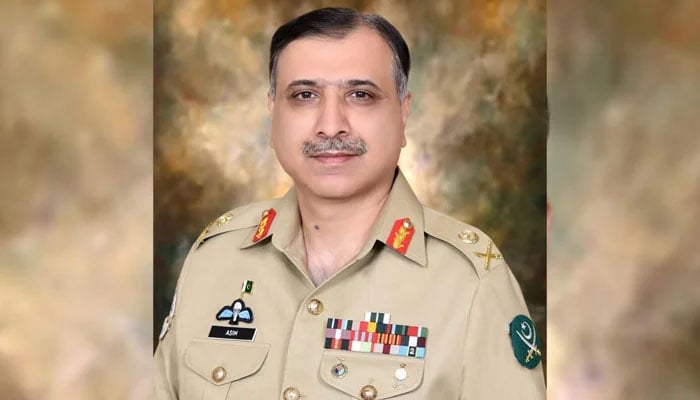Gen Asim Malik appointed first PhD-holding chief of ISI
Lt-Gen Malik will officially assume his new position on September 30, 2024
ISLAMABAD: In a significant development for Pakistan’s intelligence landscape, Lieutenant General Asim Malik has been appointed the new director-general of the Inter-Services Intelligence (ISI), marking a historic precedent as he becomes the first chief of ISI to possess a PhD.
Lt-Gen Malik will officially assume his new position on September 30, 2024. His academic background, especially his PhD work on Pakistan-US relations at the National Defence University, is intended to deepen his understanding of the complicated and often tense relationship between the two countries.
The appointment has been approved by Prime Minister Shehbaz Sharif, following recommendations from the Army. Lt-Gen Malik brings a wealth of experience from his previous role as adjutant general at the General Headquarters (GHQ) and has a robust track record, having commanded infantry divisions in Balochistan, and led an infantry brigade in the volatile region of Waziristan.
Sources close to military circles suggest that hepreviously declined two significant postings, indicating his strong rapport with COAS Gen Asim Munir, of whom he is considered a close confidant.
Lt-Gen Malik will replace Lt-Gen Nadeem Anjum, the outgoing ISI chief, who was appointed in November 2021 by former prime minister Imran Khan.With distinctions like the Sword of Honor from the Pakistan Military Academy, Lt-Gen Malik’s qualifications extend beyond national boundaries. His training includes specialized courses at the renowned Fort Leavenworth in the US and the Royal College of Defense Studies in the UK, giving him a nuanced understanding of Western strategic frameworks that may significantly influence future relations.
Lt-Gen Malik’s legacy is intertwined with that of the armed forces. His father, retired Lieutenant General G M Malik, was corps commander of Rawalpindi and held significant positions during the tenures of army chiefs General Waheed Kakar and General Jahangir Karamat, as well as during the regime of General Ziaul Haq.
As Lt-Gen Malik steps into his new role at the ISI, he will confront a myriad of challenges both at home and in the region. The agency’s reputation is currently marred by allegations of political interference, with many citizens growing increasingly wary of military involvement in governance. Moreover, the turbulent security situation in Balochistan, combined with rising insurgency threats from the TTP in Khyber Pakhtunkhwa, poses significant hurdles.
The timing of this appointment is critical, with Pakistan set to host the Shanghai Cooperation Organization (SCO) summit shortly after the new ISI head takes charge. Lt-Gen Malik’s leadership will be pivotal as the country navigates its complex security landscape while attempting to restore public trust in its military institutions.
At a time when the role of the ISI is under intense scrutiny, Lt-Gen Malik’s unique blend of academic prowess and military experience positions him as a potentially transformative figure for Pakistan’s intelligence apparatus. Whether he will be able to bridge the gap between civil-military relations while effectively responding to external and internal pressures remains to be seen.
-
 Is Human Mission To Mars Possible In 10 Years? Jared Isaacman Breaks It Down
Is Human Mission To Mars Possible In 10 Years? Jared Isaacman Breaks It Down -
 ‘Stranger Things’ Star Gaten Matarazzo Reveals How Cleidocranial Dysplasia Affected His Career
‘Stranger Things’ Star Gaten Matarazzo Reveals How Cleidocranial Dysplasia Affected His Career -
 Google, OpenAI Employees Call For Military AI Restrictions As Anthropic Rejects Pentagon Offer
Google, OpenAI Employees Call For Military AI Restrictions As Anthropic Rejects Pentagon Offer -
 Peter Frampton Details 'life-changing- Battle With Inclusion Body Myositis
Peter Frampton Details 'life-changing- Battle With Inclusion Body Myositis -
 Waymo And Tesla Cars Rely On Remote Human Operators, Not Just AI
Waymo And Tesla Cars Rely On Remote Human Operators, Not Just AI -
 AI And Nuclear War: 95 Percent Of Simulated Scenarios End In Escalation, Study Finds
AI And Nuclear War: 95 Percent Of Simulated Scenarios End In Escalation, Study Finds -
 David Hockney’s First English Landscape Painting Heads To Sotheby’s Auction; First Sale In Nearly 30 Years
David Hockney’s First English Landscape Painting Heads To Sotheby’s Auction; First Sale In Nearly 30 Years -
 How Does Sia Manage 'invisible Pain' From Ehlers-Danlos Syndrome
How Does Sia Manage 'invisible Pain' From Ehlers-Danlos Syndrome -
 Halsey Mentions How She 'gained Control' Over Endometriosis Condition
Halsey Mentions How She 'gained Control' Over Endometriosis Condition -
 Teyana Taylor Says Choosing Movies Over Music 'dumb' Choice?
Teyana Taylor Says Choosing Movies Over Music 'dumb' Choice? -
 Poland Joins Spain In Move To Ban Social Media For Children Under 15
Poland Joins Spain In Move To Ban Social Media For Children Under 15 -
 Shia LaBeouf Sent To Rehab For Not Taking ‘alcohol Addiction Seriously’
Shia LaBeouf Sent To Rehab For Not Taking ‘alcohol Addiction Seriously’ -
 ‘Stingy’ Harry, Meghan Markle Crack Open A Chasm Despite Donation: ‘Do So At Your Own Peril’
‘Stingy’ Harry, Meghan Markle Crack Open A Chasm Despite Donation: ‘Do So At Your Own Peril’ -
 Research Explores How TikTok’s Recommendation System May Influence Teen Beliefs
Research Explores How TikTok’s Recommendation System May Influence Teen Beliefs -
 Google Wins Approval To Export South Korea’s High-precision Maps After 20 Years—With Strict Conditions
Google Wins Approval To Export South Korea’s High-precision Maps After 20 Years—With Strict Conditions -
 King Charles’ Health Battle: What Has Been Revealed About His Cancer So Far
King Charles’ Health Battle: What Has Been Revealed About His Cancer So Far




